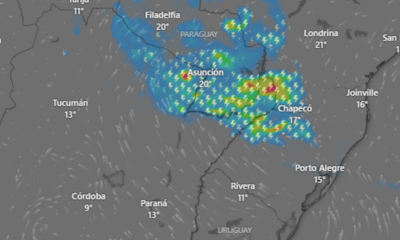INTERNACIONAL
Mariano Pensotti y el valor del teatro como “una trinchera de lo efímero”
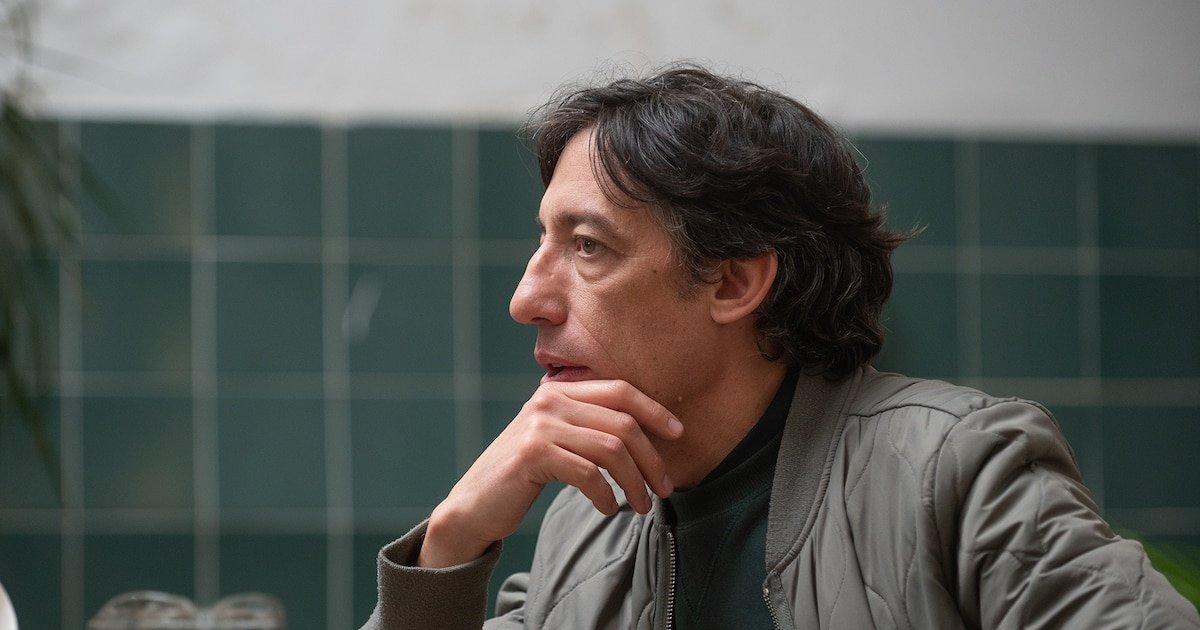
Mariano Pensotti, uno de los autores y directores más relevantes del teatro argentino del siglo XXI, no desentona en el panorama de almuerzo tardío de un día de semana, en un taller mecánico reciclado del renovado (y reciclado) barrio de Chacarita. Viene de una mañana de ensayo full para el estreno de Una sombra voraz, la nueva obra de colectivo Grupo Marea, que se presenta desde este sábado a las 20 hs. en Dumont 4040 (así será durante agosto, y luego en septiembre, los sábados a las 22 y domingos a las 18 hs.).
La pieza, que tuvo su debut mundial en versión francesa en el Festival de Avignon en 2024 y posteriormente se presentó en Austria durante el Festival de Viena este año, marca el regreso del grupo a una sala independiente tras casi dos décadas. Y arrancó desde una noticia sobre el alpinismo y sus consecuencias físicas y emocionales.
“Claramente el alpinismo es una excusa, en realidad”, dice Pensotti al inicio de su diálogo con Infobae Cultura. “Tiene un origen medio raro… Yo venía un poco obsesionado con una serie de noticias que cuentan que en los últimos años, cuerpos de escaladores empezaron a aparecer en distintas montañas del mundo, un poco por el calentamiento global. Cadáveres de personas desaparecidas, en algunos casos perdidos durante 40, 50 años. Y me pareció muy poderosa esta imagen de la naturaleza devolviendo a los muertos que había ocultado durante muchos años. A partir de ahí no sabía muy bien que carajo hacer con eso», confiesa.

Bueno, algo hizo con eso. La trama sigue a Julián Vidal, un escalador que decide enfrentar la montaña donde su padre desapareció en 1989 durante un intento de ascenso al Annapurna, el macizo montañoso en la cordillera del Himalaya, en Nepal. El intento de Julián desencadena un hecho inesperado que transforma su vida y lo convierte en figura pública. Su historia de Vidal inspira una película, para la cual eligen a Manuel Rojas, un actor en declive, quien descubre sorprendentes similitudes entre su vida y la de Vidal al interpretar el papel.
Durante la función, ambos personajes, Julián Vidal y Manuel Rojas, comparten el escenario y exponen sus perspectivas sobre los hechos, alternando sus relatos para mostrar los puntos de contacto y las diferencias entre la realidad y su representación artística. Hasta ahí, la presentación de la obra. De eso y otras cuestiones un poco más profundas, habla Mariano Pensotti en esta entrevista.
—¿Cómo le diste la vuelta a esta historia, finalmente?
—En paralelo también venía interesado en qué pasa cuando se hace una película sobre una persona real. ¿Qué le pasa al estar frente a su retrato ficcional, al verse a sí mismo desde afuera de alguna forma? ¿Y qué le pasa a un actor que tiene que interpretar a una persona real viva? ¿Cómo esa experiencia modifica a los dos? A partir de ahí fue surgiendo la historia.
Entonces, en escena, está presentado como si fuera una especie de falso biodrama. Una persona que narra y representa su historia, y al actor que lo interpretó en la película contando la versión ficcional de la película sobre esta historia real. Y además vas viendo cómo fue evolucionando el vínculo entre ellos, entre el actor que interpreta a la persona real y la persona real, a lo largo de la realización de la película. Todo esto también es un poco una excusa para hablar de varias cosas. La historia tiene que ver con el cambio climático y las cosas que está haciendo visibles y que antes estaban ocultas. No tiene que ver con el ecologismo ni nada de eso. Pero si es el disparador.
Por supuesto tiene mucho que ver con la relación entre padres e hijos. Claramente, este joven escalador cuarentón vivió siempre a la sombra de su padre, de su mítico padre escalador desaparecido. Además, el actor que lo interpreta en la película tiene una relación conflictiva con su propio padre. Ambos tienen hijos y hay algo de esa sombra del padre hamletiana, que da origen al título, Una sombra voraz. Y también tiene que ver con lo real y lo ficcional, porque la obra está un poquito inspirada en un librito de Petrarca, el poeta italiano que en el 1300 es el primero que escribe un libro sobre una escalada: Subida al Monte Ventoso, donde cuenta cómo él subió un día el Monte Ventoso en el sur de Francia. Y el libro es como una especie de carta que le manda a un amigo. Lo interesante es que muchos años después se descubrió que era ficción, que el tipo lo presenta como real pero nunca subió al Monte Ventoso y de hecho, el amigo al que le manda la carta estaba muerto hacía como 20 años…

—A partir de lo que contás pensaba en la película de Dylan, en donde se representan momentos de la vida de una persona que todavía está viva… En el caso de las obras de tu autoría ¿Cuán realista tenés que ser o cuánto te permitís serlo? ¿Y cuáles son los límites de la ficción en la creación?
—Es notable porque mi primera obra se estrenó en el 2001, o sea, hace casi 25 años que vengo haciendo obras y siempre me interesó la mezcla de realidad y ficción. Cómo la realidad influye en la ficción, pero también cómo la ficción puede transformar la realidad. Pero siempre fue algo que estaba dentro de las historias, de lo que le pasaba a los personajes, no tanto en el formato. Yo siento que hay algo posteatro documental, posbiodrama, inteligencia artificial, fake news y demás… Donde nuestra percepción de qué es lo real y qué es lo ficcional ha cambiado por completo. Eso ha entrado en crisis. Absolutamente. A mí me parecía muy interesante en esta obra tratar de explorar algo de esos bordes, de esos extremos, desde lo teatral.
Por ejemplo, esta obra está presentada como si fuera teatro documental. De hecho, los actores arrancan diciendo “esto es una historia real, todo esto pasó de verdad”. Se supone que la historia está basada en una historia real. Utilizamos un montón de procedimientos vinculados al drama o al teatro documental, como por ejemplo decir “este vaso es el vaso que usaba mi viejo”. Generar pruebas. Pero toda la historia es totalmente ficcional. O sea, solo tiene estas bases reales de casos reales que pasaron en el mundo, pero no es una historia documental para nada. Me parece interesante, justamente en este momento donde uno empieza a cuestionarse qué es lo real o cómo se inventa una ficción. Cómo la realidad va siendo transformada por la ficción, y cómo a veces la ficción es mucho más conmovedora que lo real. En definitiva, ya no sabemos si nosotros creamos ficciones o son las ficciones las que nos están creando a nosotros.
—¿Y eso es bueno o es malo?
—En general trato de no pensar tanto en términos de “bueno o malo” como autor. Trato de pensar qué me resulta poderoso o interesante poéticamente. Es más interesante poner en cuestión, en las obras, esas cosas. Creo que no es ni bueno ni malo, es algo que está sucediendo y sobre lo que es interesante reflexionar, operar poéticamente y ver también como se construye ficción sobre eso.

Hay algo interesante en el teatro que no tienen muchas otras disciplinas, que es su inmediatez. Creo que históricamente el teatro siempre ha sido más flexible y que tiene más posibilidades de reflexionar sobre ciertas cosas que están pasando. Mucho más que el cine o la literatura, a los que por ahí le lleva seis o siete años hacer una película o una novela. El teatro sigue teniendo una inmediatez única y en ese sentido, artísticamente, a mí me resulta muy interesante ser permeable a eso que está pasando. Ojo, no me refiero a hacer obras con el diario de una mano, pero un poco sí también. Quizás no sobre la noticia de hoy, pero fantasear cuál puede ser la noticia de mañana.
—Hay algo muy perceptible en este tiempo de pantallas y multiplicidad de estímulos audiovisuales, y es una especie de revalorización del teatro como ritual colectivo. El caso de un grupo de gente que se mete en una sala a oscuras para ver a otras personas que, sin mediar una pantalla, están ahí y “actuán”, en vivo ¿Por qué crees que sucede eso? ¿Cuál es la potencia del teatro hoy?
—Seguramente es muy diferente para una generación que no vivió la previa de eso. Hay algo de la revalorización del impacto del teatro como hecho vivo, que quizás antes estaba diluida. El teatro siempre estuvo ahí, por supuesto, pero ahora salta mucho más a la vista. Es un ritual de “nosotros”, de “estar acá”. El teatro se construye mucho con el público, con el que está mirando, con su reacción, con su presencia viva. Y eso es absolutamente irremplazable (quizás la música en vivo puede generar algo así pero no muchas otra disciplinas). Lo performático está ahí.
Y también ese “peligro” de que sea distinto cada noche, que estás viendo algo que es irrepetible y que también es completamente efímero. Todo lo que circula hoy, las fotos, los videos, tienen la pretensión de lo eterno: todas estas fotos, todas estas cositas, todas estas pelotudeces, quedarán para siempre, por más que sabemos que no es así. El teatro sigue siendo la trinchera de lo efímero. En ese sentido creo que se parece mucho más a la experiencia vital, a algo que solo queda en la memoria.
Siempre me fascinó esta idea de que el teatro después se va transformando en otras ficciones. Porque cuando vos contás… Si yo te cuento a vos la película que vi antes de ayer, te la voy a contar a mi manera. Pero después vas a ver esa película y vos vas a ver cómo es. Y esa película sigue siendo siempre igual. En teatro, si yo te cuento la obra que vi, te la voy a contar a mi manera. Y cuando vos la vayas a ver, no será la misma que yo vi… Es una ficción que genera otras ficciones de lo inmediato, de los cuerpos vivos que para mí, en este momento, es más relevante que nunca. En ese sentido, a mí siempre me gustan más las obras que se hacen ahora, las que hacen mis contemporáneos. Pero de todas formas, no dejo de notar y de valorar que también el teatro tiene una historia que sigue dialogando con el presente. Vos vas a ver un Shakespeare, una obra de Griselda Gambaro y sigue habiendo un montón de cosas que te resuenan ahora, en el presente. El teatro tiene esa particularidad: tiene una historia enorme, pero es completamente efímero y a la vez tiene la capacidad de interpelar al presente. Es muy raro el teatro.
[Fotos: Jaime Olivos; prensa Una sombra voraz]
INTERNACIONAL
Un zoológico en Dinamarca quiere alimentar a sus depredadores con tus mascotas
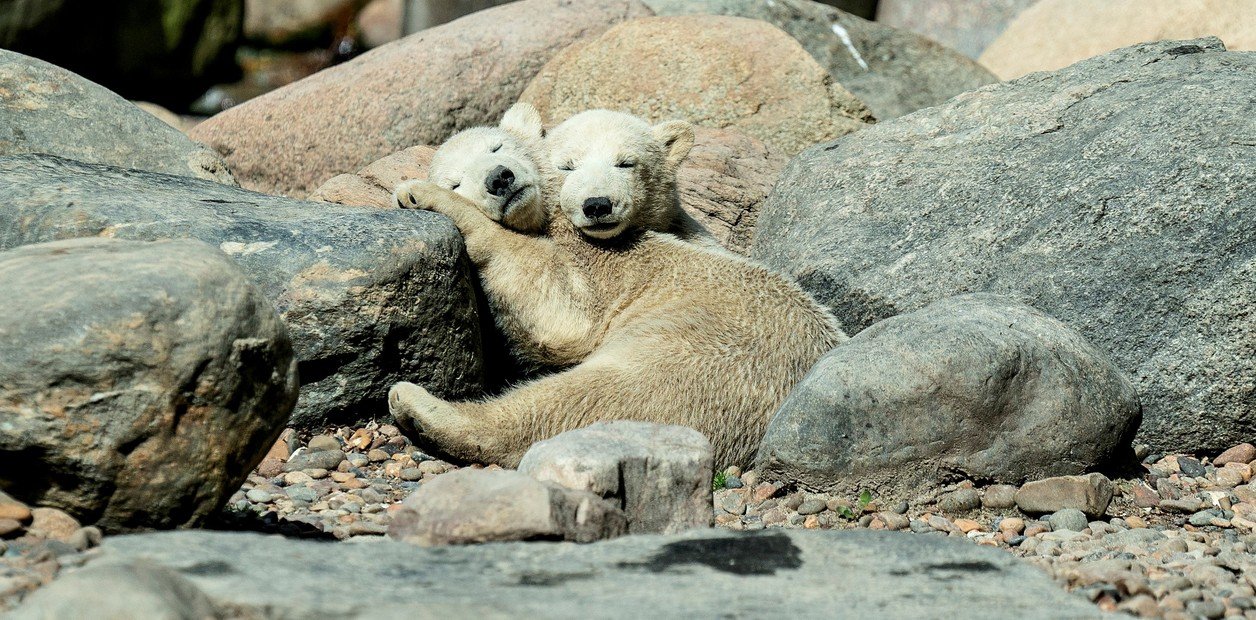
Posturas
INTERNACIONAL
WATCH: Trump says FBI ‘may have to’ help Texas round up AWOL Dem lawmakers
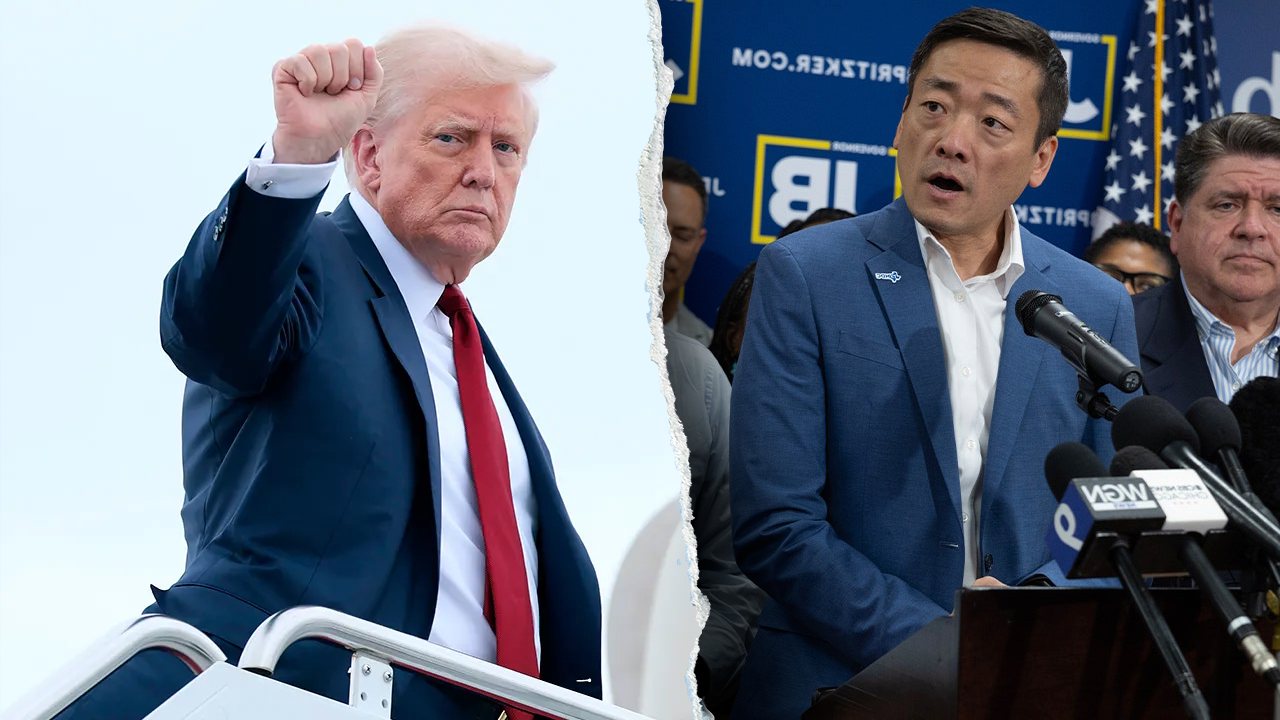
NEWYou can now listen to Fox News articles!
President Donald Trump said Tuesday evening that the FBI «may have to» round up a group of Democratic lawmakers who fled Texas to avoid voting on the state’s proposed redistricting map.
This comes as Texas Gov. Greg Abbott and several Texas leaders, including Attorney General Ken Paxton, have demanded that the 50 Democratic members of the state legislature who fled the state return or face consequences.
The Democrats fled the state in an effort to deny Republicans the necessary two-thirds quorum required to vote on the redistricting map, which would likely give the GOP an edge in elections and potentially add five House seats to the Texas Republican congressional delegation.
National Democrats have praised the stunt. During a press conference on Sunday, Illinois Gov. J.B. Pritzker, a leading Democratic figure, shared his support for the Texas Democrats, describing their departure as a «righteous act of courage,» while claiming Republicans want to silence «millions of voices, especially Black and Latino voters.»
FBI URGED TO LOCATE OR ARREST TEXAS DEMOCRATS WHO FLED STATE TO STALL REDISTRICTING VOTE
President Trump said Tuesday the FBI «may have to» round up Texas Democrats who fled the state to block a vote on redistricting. At right, the group speaks to the press after leaving. (Anna Moneymaker/Getty Images; Scott Olson/Getty Images )
Abbott said the lawmakers’ commitment to voting as elected state officials is a duty and is «not optional.» The governor also said a legislator determined to have «forfeited his or her office due to abandonment» can be removed from office under the Texas Constitution, thereby creating a vacancy, which the governor can «swiftly fill» under Article III, Section 13.
After the Democrats failed to meet Abbott’s 4 p.m. CT Monday deadline to return, Texas Speaker of the House Dustin Burrows announced he would sign arrest warrants against any absent Democrat lawmakers if authorized by a vote of the chamber. Shortly thereafter, the House did approve the warrants and Abbott then swiftly called on the Texas Department of Public Safety to arrest the «delinquent Texas House Democrats.»
The attorney general has stated that the lawmakers «should be found and arrested no matter where they go.»
Trump weighed in on the political intrigue Tuesday at the White House when he was asked by a reporter, «Do you want the federal government and the FBI to help locate and arrest these Texas Democrats who have left the state?»
‘ALL-OUT WAR’: FLEEING TEXAS DEMS SIDE WITH NEWSOM AS REDISTRICTING STANDOFF CONTINUES: ‘FIRE WITH FIRE’
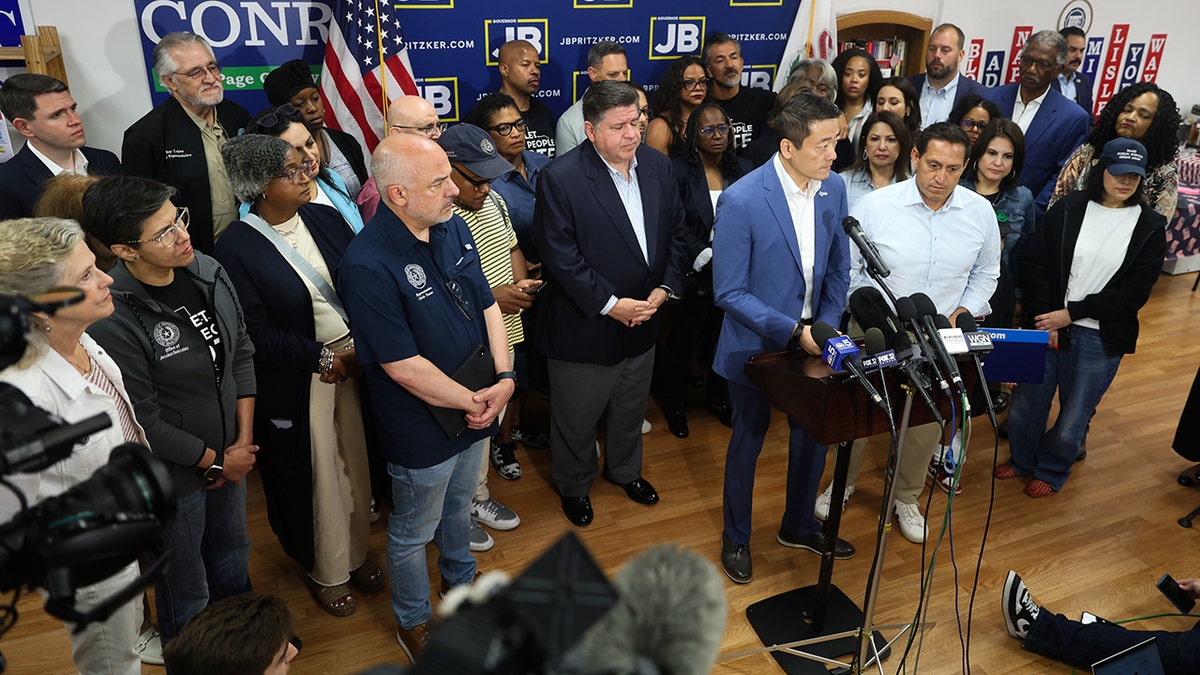
Texas House Democratic Caucus Chair Gene Wu speaks at a press event in Illinois after he and dozens of fellow lawmakers fled Texas to block a redistricting vote, Aug. 3, 2025. (Scott Olson/Getty Images)
The president responded that it is a bad look for Democrats to «abandon» the state rather than fight it out in the legislature.
«Well, I think they’ve abandoned the state,» he said. «Nobody’s seen anything like it, even though they’ve done it twice before. And, in a certain way, it almost looks like they’ve abandoned the state. Looks very bad.»
Pressed further on whether the FBI should get involved, Trump answered, «Well, they may have to.»
«They may have to,» he repeated. «No, I know they want them back. Not only the attorney general, the governor wants them back. If you look, I mean the governor of Texas is demanding they come back. So, a lot of people are demanding they come back. You can’t just sit it out. You have to go back. You have to fight it out. That’s what elections are all about.»
‘BUTTER KNIFE TO A GUNFIGHT’: DEMOCRATIC LAWMAKER RIPS HIS PARTY’S STRATEGY IN REDISTRICTING BATTLE

A view of the Texas State Capitol in Austin as the GOP-led redistricting session continues without dozens of absent House Democrats. (Brandon Bell/Getty Images)
Asked by Fox News Channel’s Peter Doocy whether he thought Texas’ redistricting plans were worth risking blue states similarly retaliating, Trump answered, «They’ll do it anyway.»
«Why, if we stop over there, they would have done it anyway,» he said. «Look, a lot of these states, you know, I watched this morning as Democrats are complaining and they’re complaining from states where they’ve done it, like in Illinois, like in Massachusetts.»
«The Democrats have done it long before we started. They’ve done it all over the place. They did it in New York. They did it in a lot of different states,» Trump went on.
CALIFORNIA GOV. GAVIN NEWSOM’S ‘HYPER-PARTISAN’ MAP IS ‘UNIQUELY CORRUPT,’ GOP LAWMAKER ARGUES
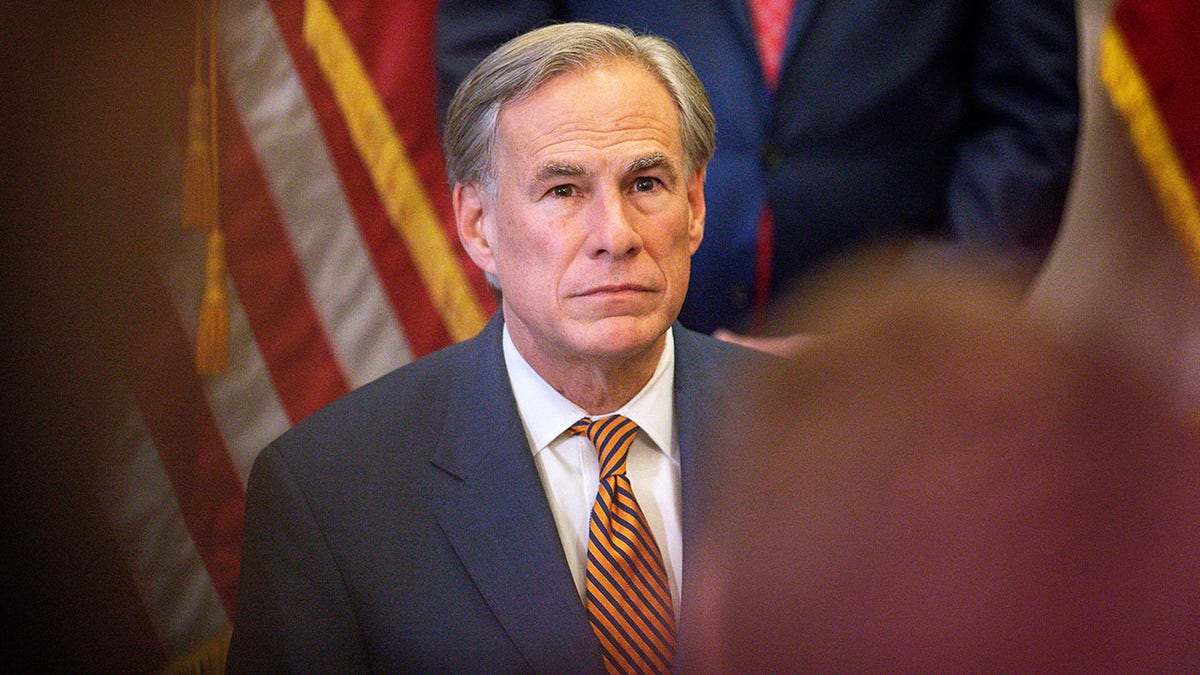
Texas Gov. Greg Abbott said lawmakers who fled the state may be removed from office and may also be liable to felony charges. (Montinique Monroe/Getty Images)
The president went on to praise Texas’ redistricting plans, saying, «There’s tremendous support for it.» He also praised Abbott, saying the future of the plans depends on him.
CLICK HERE TO GET THE FOX NEWS APP
«Texas is a place that’s done very well with a free enterprise kind of an attitude, with the exact opposite of what’s happening in New York with a communist mayor. And they know what they’re doing. And they’re doing the right thing,» he said. «So, we’ll see what happens. We have a wonderful governor in Texas. He feels strongly about it. It’s going to be up to him.»
Fox News Digital’s Elizabeth Pritchett and Alec Schemmel contributed to this report.
donald trump,texas,elections disputes,democratic party,greg abbott
INTERNACIONAL
Russia and China tick Doomsday Clock toward midnight as Hiroshima bombing hits 80 years
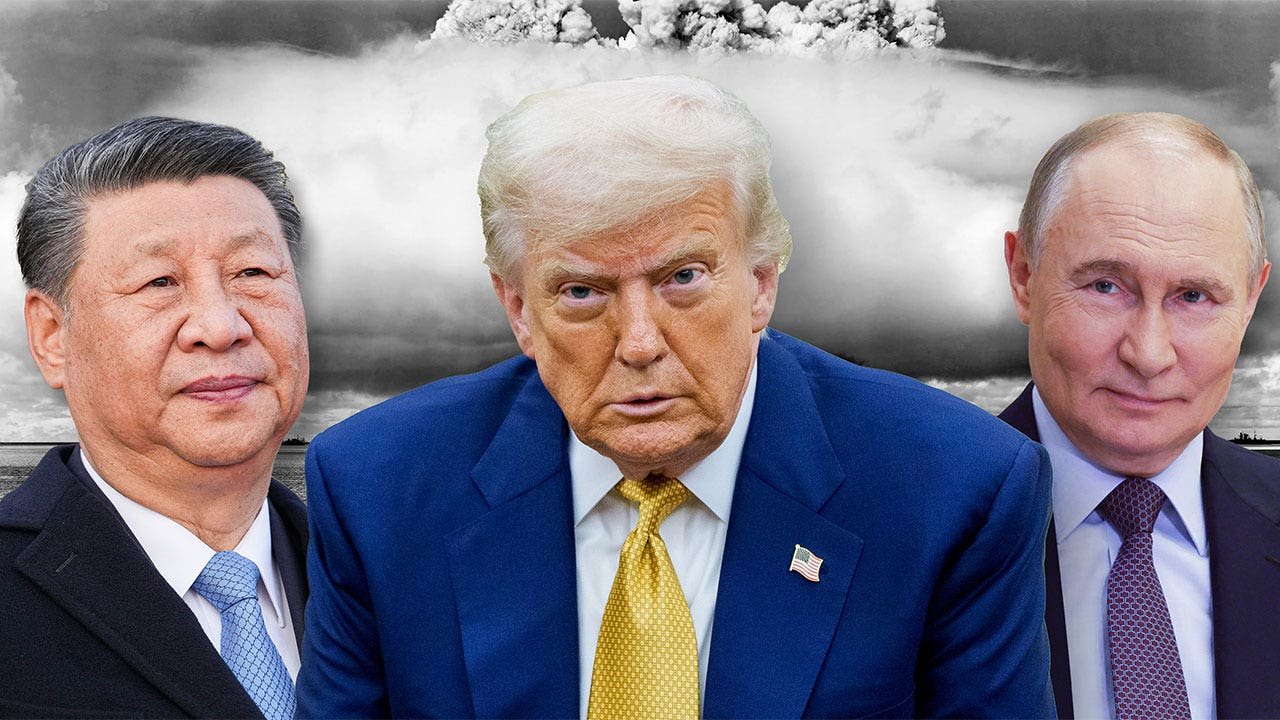
NEWYou can now listen to Fox News articles!
Wednesday marks the 80th anniversary of when the U.S. employed the first ever nuclear bomb over the Japanese city of Hiroshima, followed by the bombing of Nagasaki three days later on Aug. 9. But despite nearly a century of lessons learned, nuclear warfare still remains a significant threat.
«This is the first time that the United States is facing down two nuclear peer adversaries – Russia and China,» Rebeccah Heinrichs, nuclear expert and senior fellow at the Hudson Institute, told Fox News Digital.
Heinrichs explained that not only are Moscow and Beijing continuing to develop new nuclear capabilities and delivery systems, but they are increasingly collaborating with one another in direct opposition to the West, and more pointedly, the U.S.
TRUMP LIFTS VEIL ON US SUBMARINES IN WARNING SHOT TO KREMLIN IN ‘CLEVER’ REPOSITIONING MOVE
An aerial photograph of Hiroshima, Japan, shortly after the «Little Boy» atomic bomb was dropped in 1945. (Universal History Archive/UIG via Getty images)
«It’s a much more complex nuclear threat environment than what the United States even had to contend with during the Cold War, where we just had one nuclear peer adversary in the Soviet Union,» she said. «In that regard, it’s a serious problem, especially when both China and Russia are investing in nuclear capabilities and at the same time have revanchist goals.»
Despite the known immense devastation that would accompany an atomic war between two nuclear nations, concern has been growing that the threat of nuclear war is on the rise.
The bombings of Hiroshima and Nagasaki – which collectively killed some 200,000 people, not including the dozens of thousands who later died from radiation poisoning and cancer – have been attributed with bringing an end to World War II.
But the bombs did more than end the deadliest war in human history – they forever changed military doctrine, sparked a nuclear arms race and cemented the concept of deterrence through the theory of mutually assured destruction.
Earlier this year the Bulletin of Atomic Scientists moved forward the «Doomsday Clock» by one second – pushing it closer to «midnight,» or atomic meltdown, than ever before.
In January, the board of scientists and security officials in charge of the 78-year-old clock, which is used to measure the threat level of nuclear warfare, said that moving the clock to 89 seconds to midnight «signals that the world is on a course of unprecedented risk, and that continuing on the current path is a form of madness.»
TRUMP CONFIRMS 2 NUCLEAR SUBMARINES ARE ‘IN THE REGION’ TO COUNTER RUSSIA
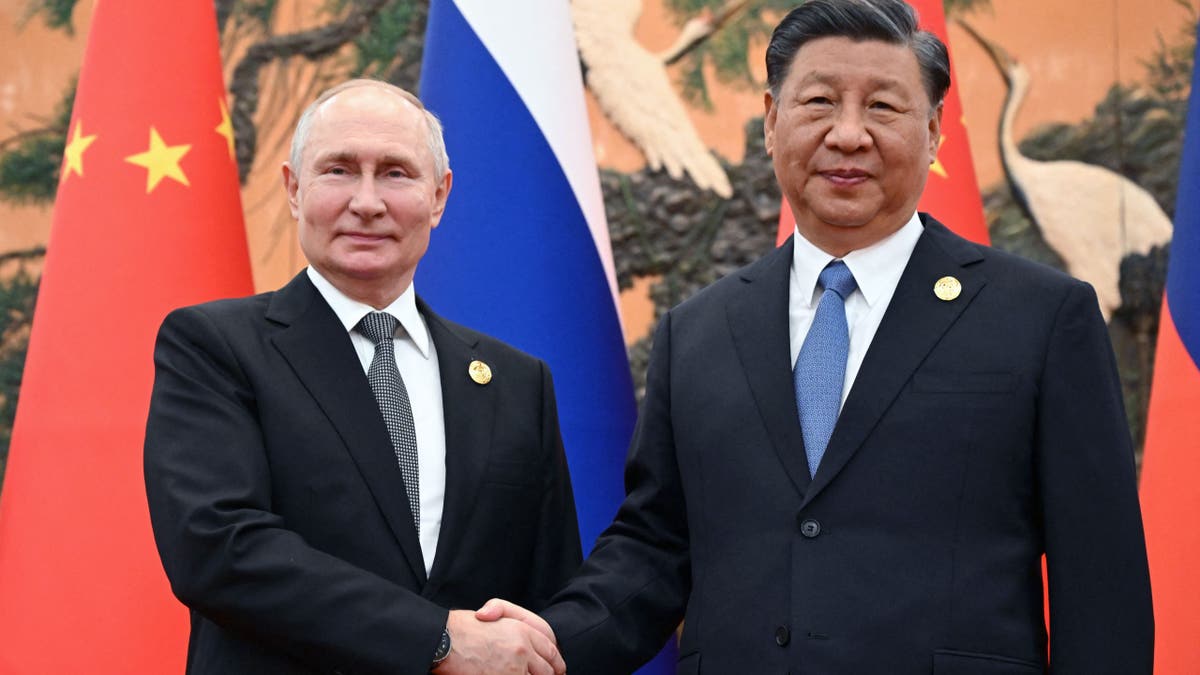
Russia’s President Vladimir Putin and Chinese President Xi Jinping shake hands during a meeting in Beijing on Oct. 18, 2023. (Sergei Guneyev/Pool/AFP via Getty Images)
Despite the escalated nuclear threats coming out of North Korea, and international concern over the Iranian nuclear program, the threat level largely came down to the three biggest players in the nuclear arena: Russia, the U.S. and China.
The increased threat level was attributed to Russia’s refusal to comply with international nuclear treaties amid its continuously escalating war in Ukraine and its hostile opposition to NATO nations, as well as China’s insistence on expanding its nuclear arsenal.
But the Bulletin, which was founded by scientists on the Manhattan Project in 1945 to inform the public of the dangers of atomic warfare, also said the U.S. has a role in the increased nuclear threat level.
«The U.S. has abdicated its role as a voice of caution. It seems inclined to expand its nuclear arsenal and adopt a posture that reinforces the belief that ‘limited’ use of nuclear weapons can be managed,» the Bulletin said. «Such misplaced confidence could have us stumble into a nuclear war.»
But Heinrichs countered the «alarmist» message and argued that deterrence remains a very real protectant against nuclear warfare, even as Russia increasingly threatens Western nations with atomic use.
«I do think that it’s a serious threat. I don’t think it’s inevitable that we’re sort of staring down nuclear Armageddon,» she said.
CHINA’S GROWING NUCLEAR ARSENAL AIMS TO BREAK US ALLIANCES AND DOMINATE ASIA, REPORT WARNS
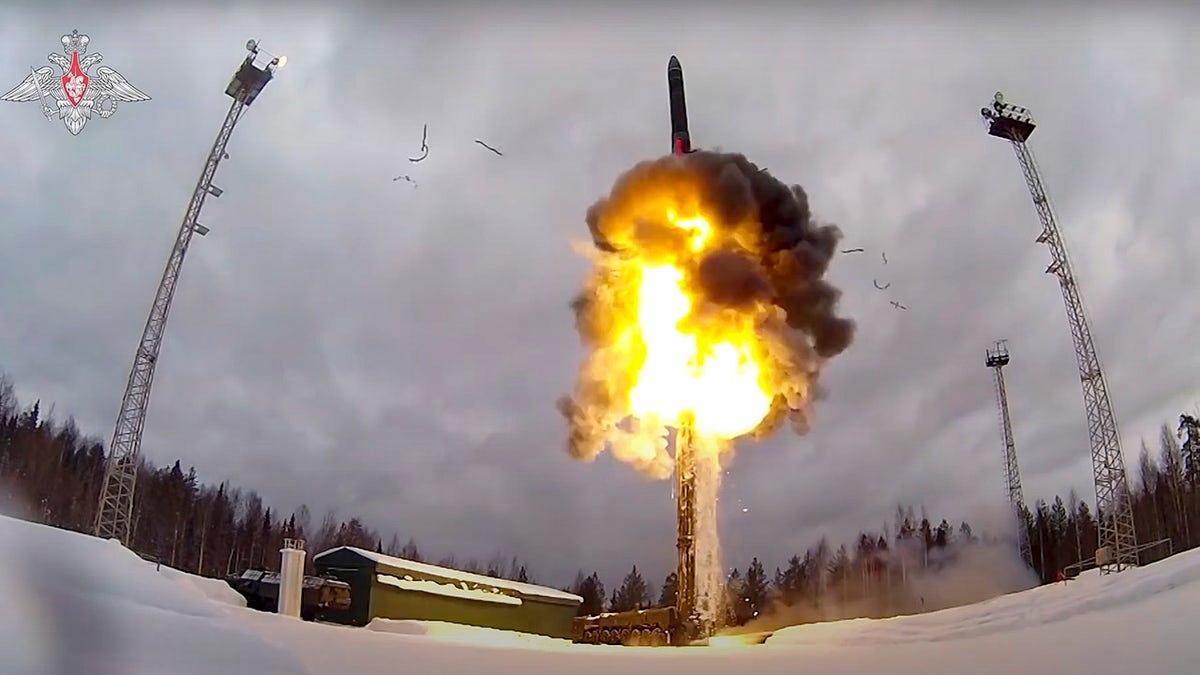
A Yars intercontinental ballistic missile is launched from an air field during military drills in Russia on Feb. 19, 2022. (Russian Defense Ministry Press Service via AP, File)
Heinrichs argued the chief threat is not the number of nuclear warheads a nation possesses, but in how they threaten to employ their capabilities.
«I think that whenever there is a threat of nuclear use, it’s because adversaries, authoritarian countries, in particular Russia, is threatening to use nuclear weapons to invade another country. And that’s where the greatest risk of deterrence failure is,» she said. «It’s not because of the sheer number of nuclear weapons.»
Heinrichs said Russia is lowering the nuclear threshold by routinely threatening to employ nuclear weapons in a move to coerce Western nations to capitulate to their demands, as in the case of capturing territory in Ukraine and attempting to deny it NATO access.
Instead, she argued that the U.S. and its allies need to improve their deterrence by not only staying on top of their capabilities but expanding their nuclear reach in regions like the Indo-Pacific.
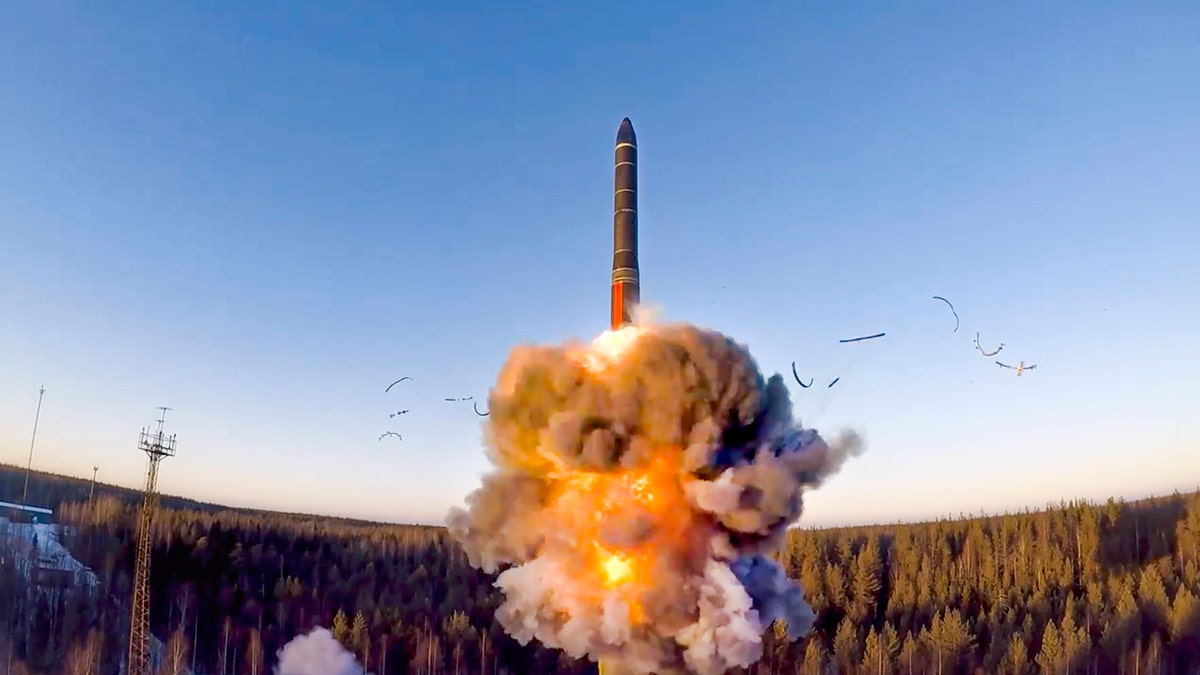
A rocket launches from missile system from the Plesetsk facility in northwestern Russia on Dec. 9, 2020. (Russian Defense Ministry Press Service via AP, File)
CLICK HERE TO GET THE FOX NEWS APP
«The answer is not to be so afraid of it or alarmed that you capitulate, because you’re only going to beget more nuclear coercion if you do that,» she said. «The answer is to prudently, carefully communicate to the Russians they are not going to succeed through nuclear coercion, that the United States also has credible response options.
«We also have nuclear weapons, and we have credible and proportional responses, and so they shouldn’t go down that path,» Heinrichs said. «That’s how we maintain the nuclear peace. That’s how we deter conflict. And that’s how we ensure that a nuclear weapon is not used.»
nuclear proliferation,russia,china,world war two,defense,world

 SOCIEDAD2 días ago
SOCIEDAD2 días agoHay alerta amarilla por tormentas y frío extremo para este lunes 4 de agosto: las provincias afectadas

 POLITICA2 días ago
POLITICA2 días agoMilei afirmó que la elección en la provincia de Buenos Aires “podría significar el fin del kirchnerismo”

 POLITICA1 día ago
POLITICA1 día agoMartín Menem se refirió al escándalo de Tech Security que involucra a su familia: “Nos quieren meter a todos en la misma bolsa”



















